Author Archives: Rita Kozlov
Author Archives: Rita Kozlov
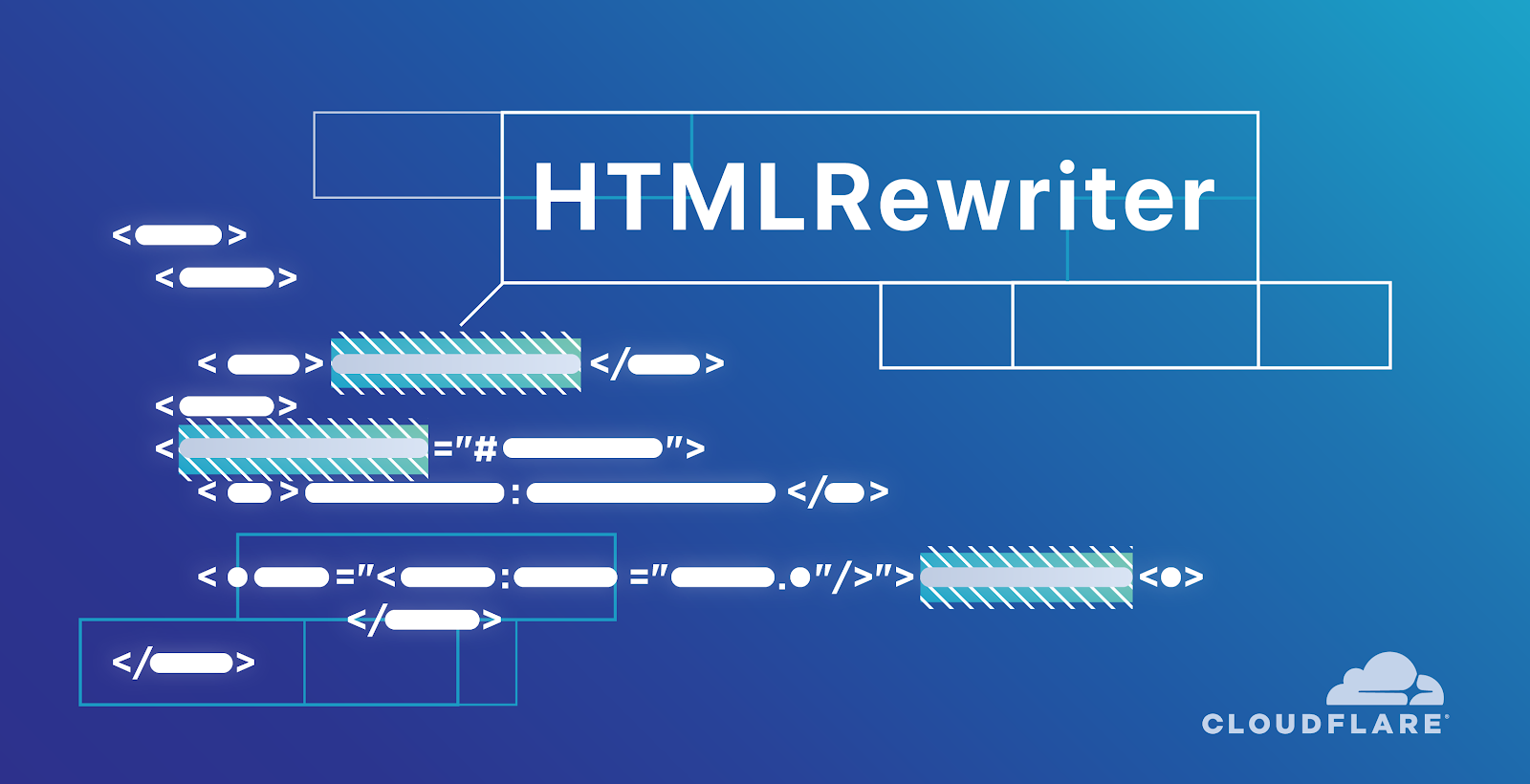
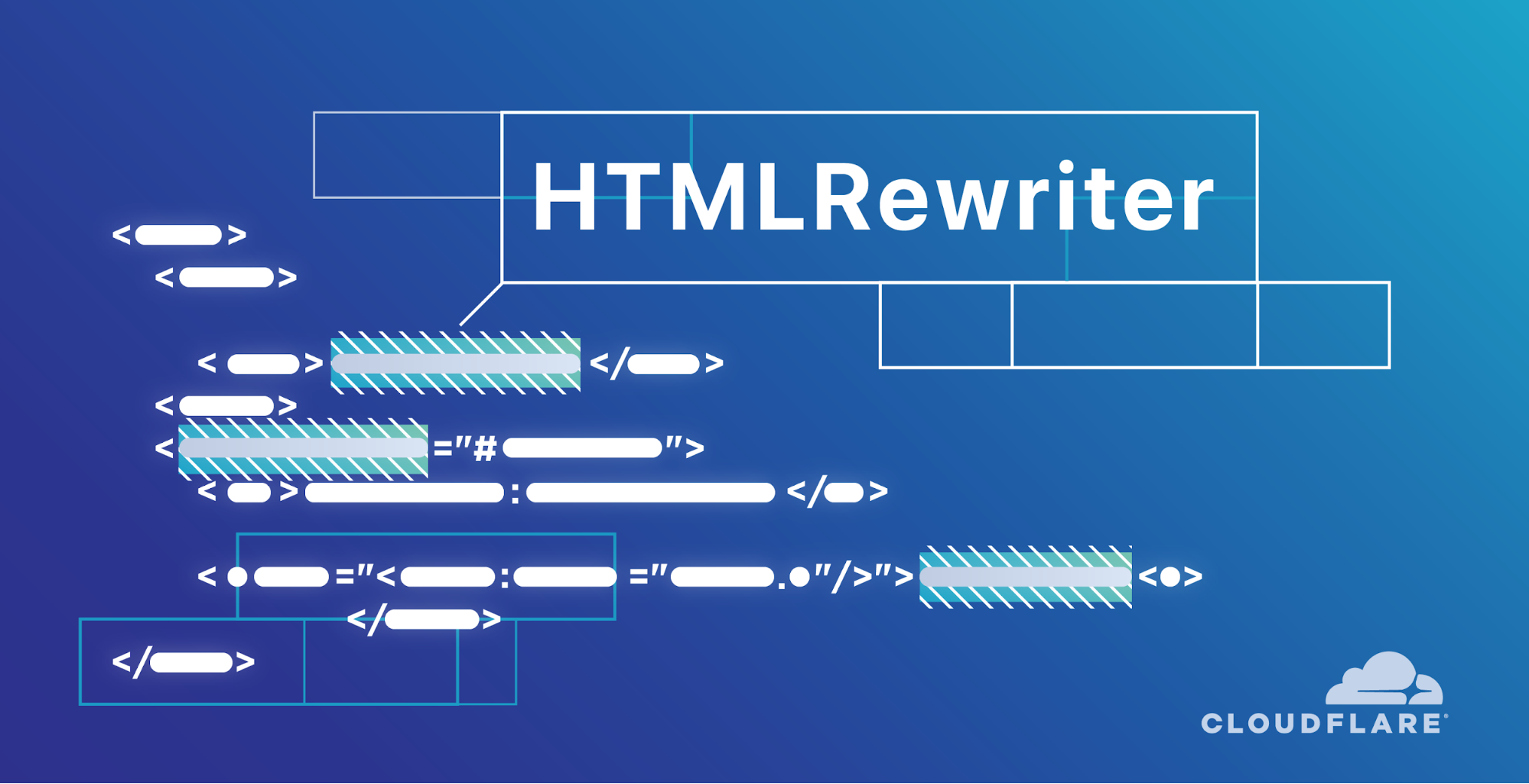
We are excited to announce that the HTMLRewriter API for Cloudflare Workers is now GA! You can get started today by checking out our documentation, or trying out our tutorial for localizing your site with the HTMLRewriter.
Want to know how it works under the hood? We are excited to tell you everything you wanted to know but were afraid to ask, about building a streaming HTML parser on the edge; read about it in part 1 (and stay tuned for part two coming tomorrow!).
The HTMLRewriter can help solve two big problems web developers face today: making changes to the HTML, when they are hard to make at the server level, and making it possible for HTML to live on the edge, closer to the user — without sacrificing dynamic functionality.
Since the introduction of Workers, Workers have helped customers regain control where control either wasn’t provided, or very hard to obtain at the origin level. Just like Workers can help you set CORS headers at the middleware layer, between your users and the origin, the HTMLRewriter can assist with things like URL rewrites (see the example below!).
Back Continue reading
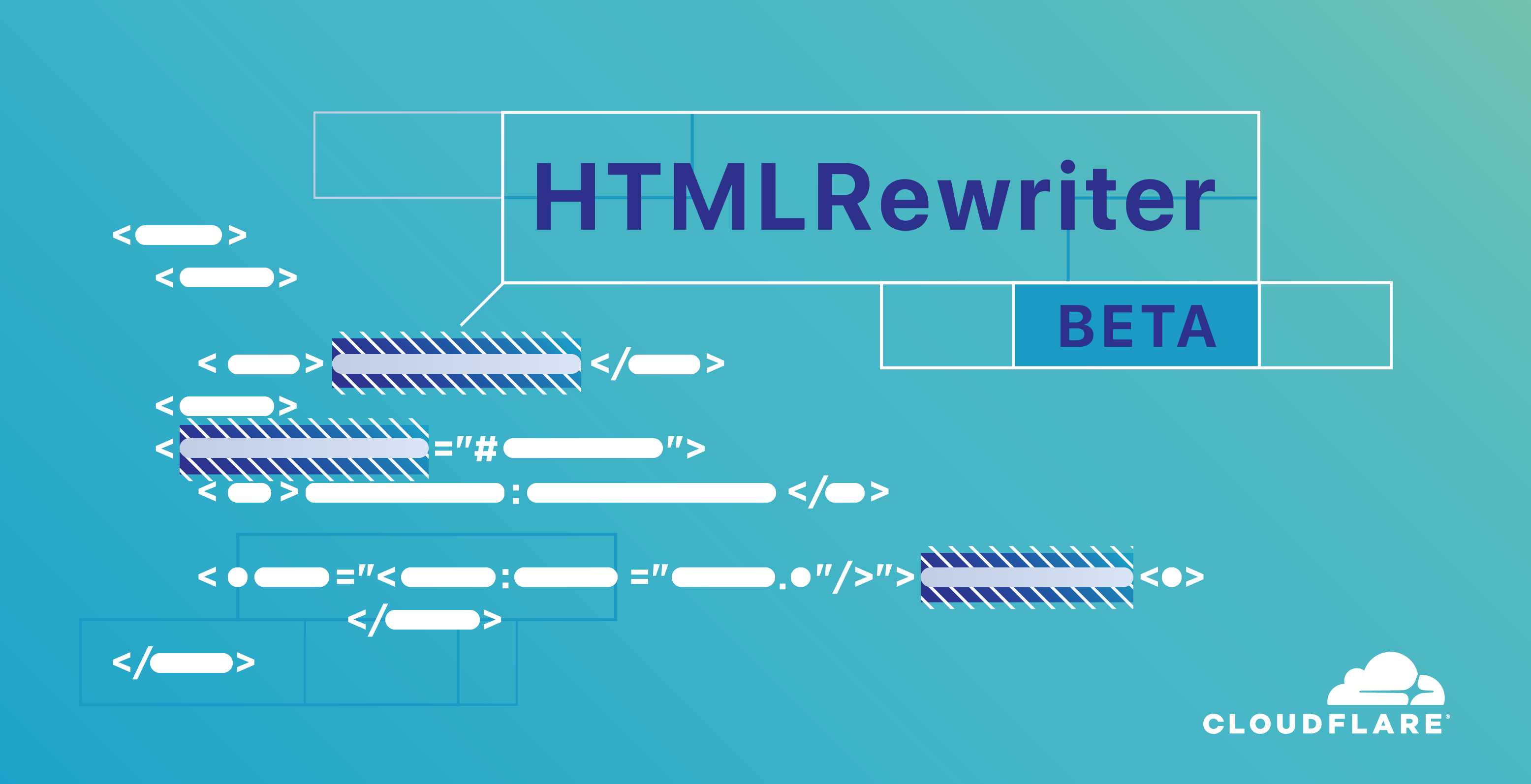
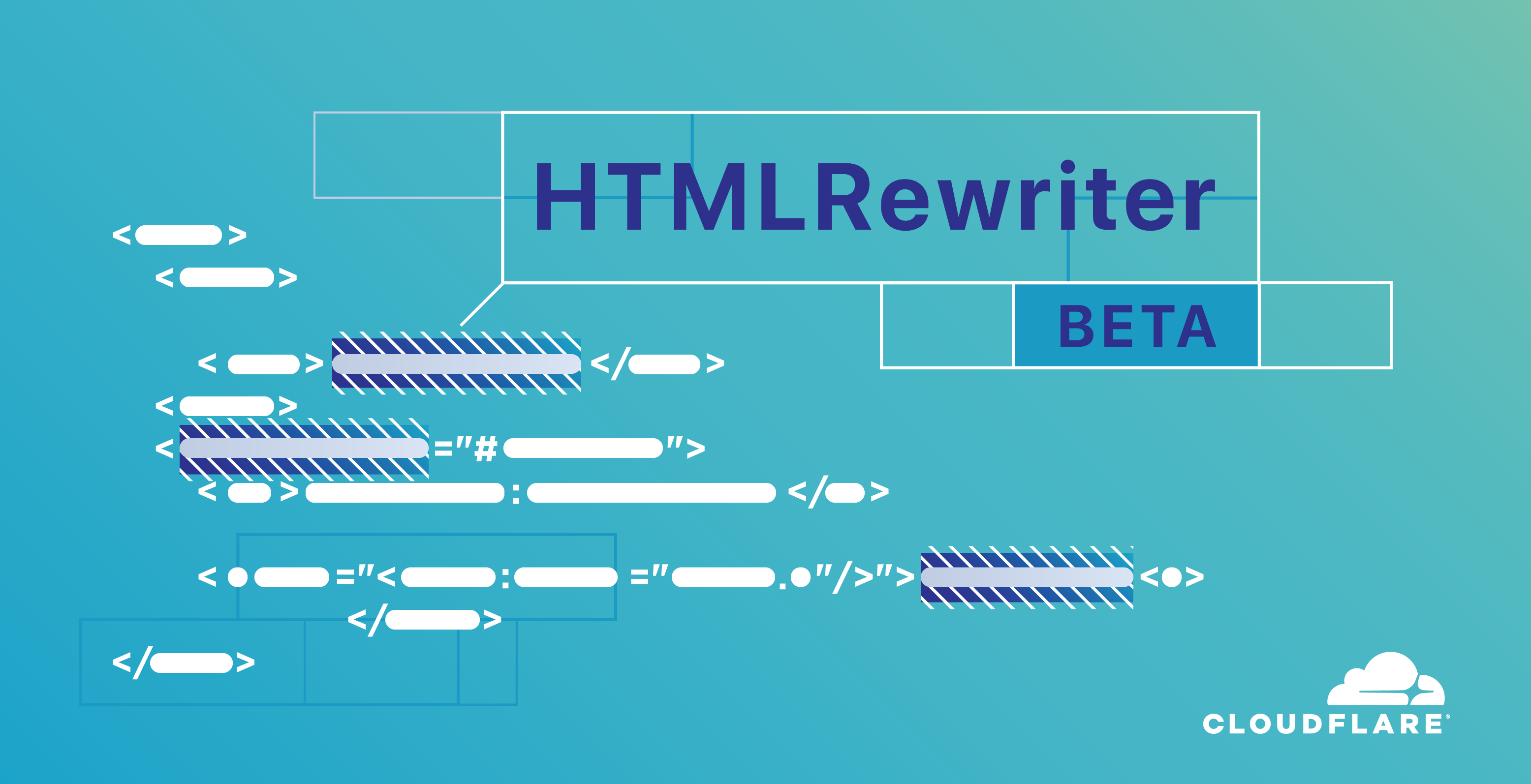
Today, we’re excited to announce HTMLRewriter beta — a streaming HTML parser with an easy to use selector based JavaScript API for DOM manipulation, available in the Cloudflare Workers runtime.
For those of you who are unfamiliar, Cloudflare Workers is a lightweight serverless platform that allows developers to leverage Cloudflare’s network to augment existing applications or create entirely new ones without configuring or maintaining infrastructure.
On Friday we announced Workers Sites: a static site deployment workflow built into the Wrangler CLI tool. Now, paired with the HTML Rewriter API, you can perform DOM transformations on top of your static HTML, right on the Cloudflare edge.
You could previously do this by ingesting the entire body of the response into the Worker, however, that method was prone to introducing a few issues. First, parsing a large file was bound to run into memory or CPU limits. Additionally, it would impact your TTFB as the body could no longer be streamed, and the browser would be prevented from doing any speculative parsing to load subsequent assets.
HTMLRewriter was the missing piece to having your application fully live on the edge – soup to nuts. You can Continue reading

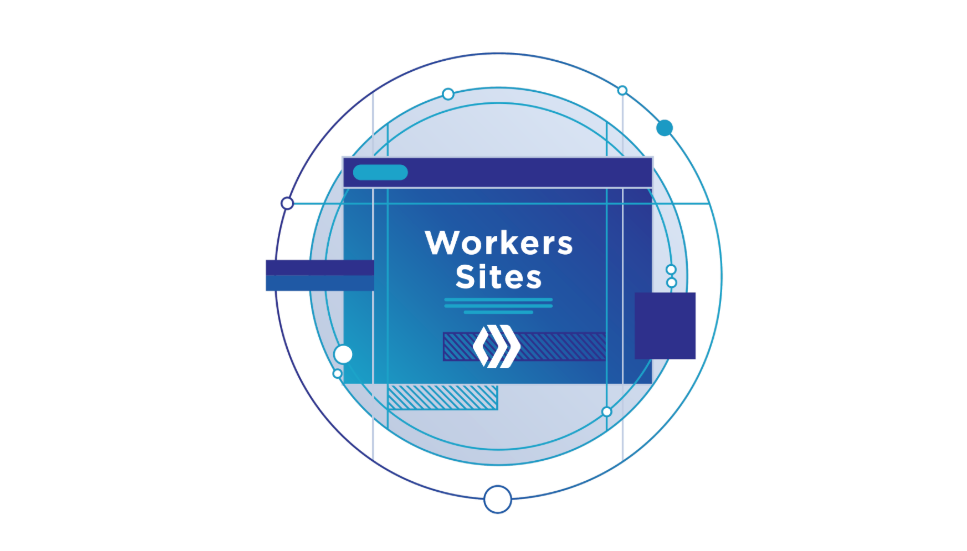
Performance on the web has always been a battle against the speed of light — accessing a site from London that is served from Seattle, WA means every single asset request has to travel over seven thousand miles. The first breakthrough in the web performance battle was HTTP/1.1 connection keep-alive and browsers opening multiple connections. The next breakthrough was the CDN, bringing your static assets closer to your end users by caching them in data centers closer to them. Today, with Workers Sites, we’re excited to announce the next big breakthrough — entire sites distributed directly onto the edge of the Internet.
Why isn’t just caching assets sufficient? Yes, caching improves performance, but significant performance improvement comes with a series of headaches. The CDN can make a guess at which assets it should cache, but that is just a guess. Configuring your site for maximum performance has always been an error-prone process, requiring a wide collection of esoteric rules and headers. Even when perfectly configured, almost nothing is cached forever, precious requests still often need to travel all the way to your origin (wherever it may be). Cache invalidation is, after all, Continue reading

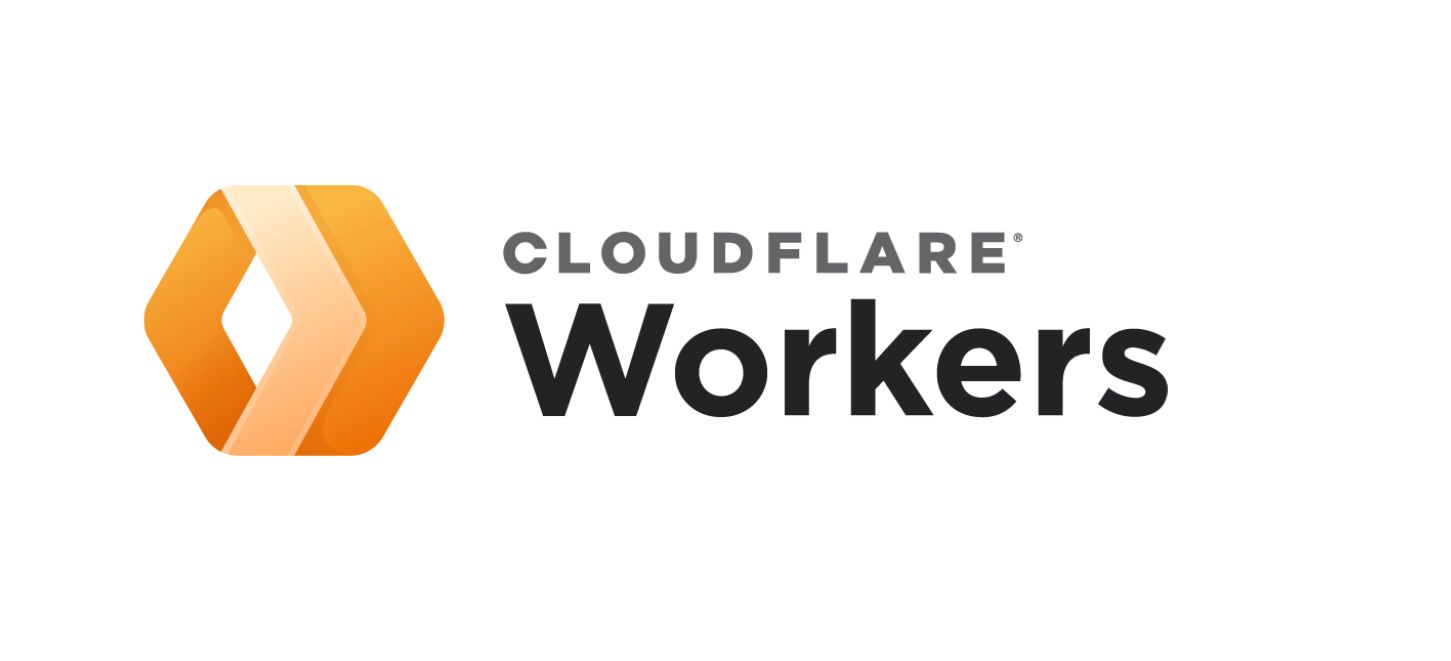
We’re excited to announce that starting today, Cloudflare Workers® gets a CLI, new and improved docs, multiple scripts for everyone, the ability to run applications on workers.dev without bringing your own domain, and a free tier to make experimentation easier than ever. We are building the serverless platform of the future, and want you to build your application on it, today. In this post, we’ll elaborate on what a serverless platform of the future looks like, how it changes today’s paradigms, and our commitment to making building on it a great experience.
Three years ago, I was interviewing with Cloudflare for a Solutions Engineering role. As a part of an interview assignment, I had to set up an origin behind Cloudflare on my own domain. I spent my weekend, frustrated and lost in configurations, trying to figure out how to set up an EC2 instance, connect to it over IPv6, and install NGINX on Ubuntu 16.4 just so I could end up with a static site with a picture of my cat on it. I have a computer science degree, and spent my career up until that point as a software engineer — building this simple app was Continue reading
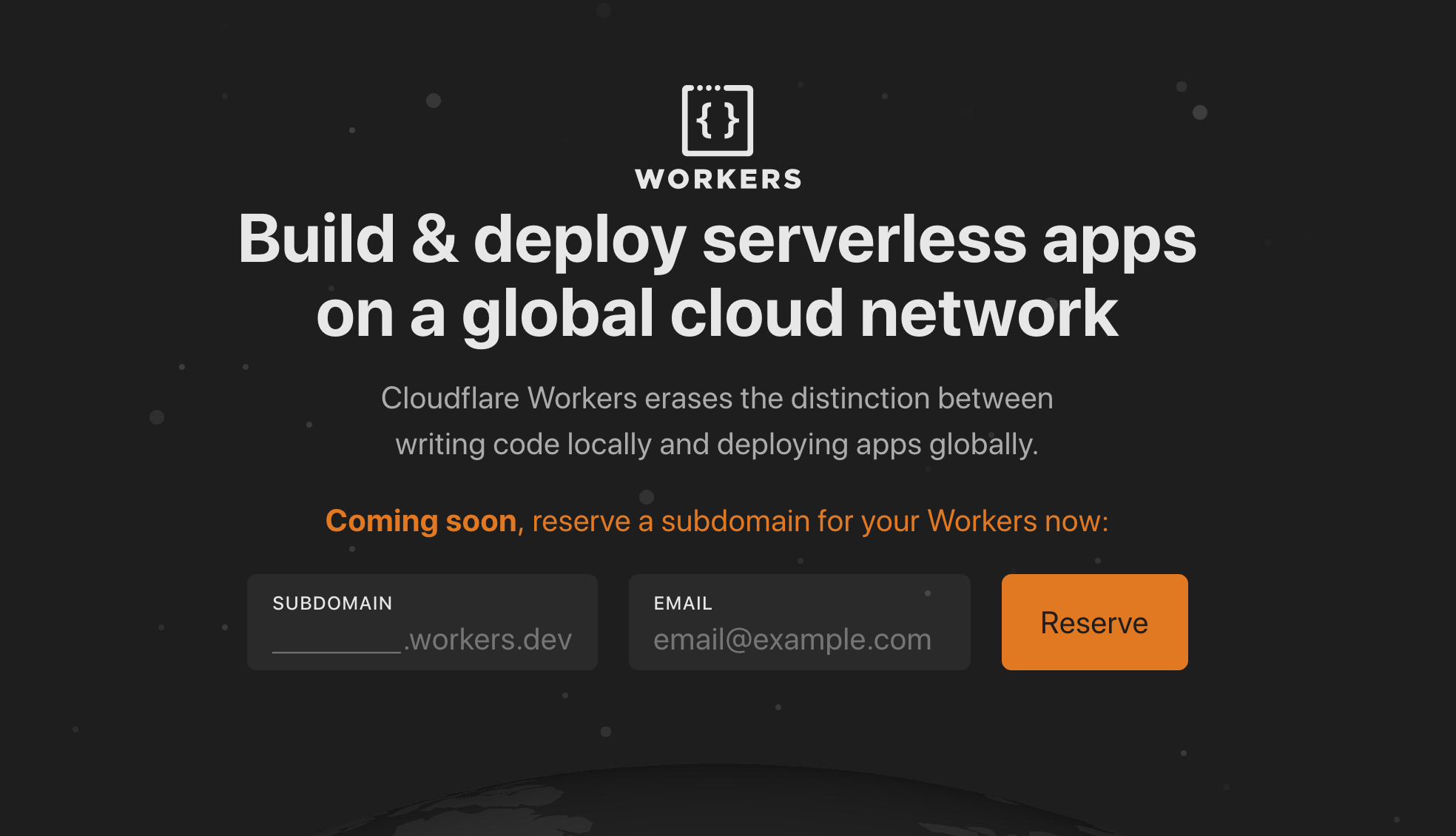
We are working really hard to allow you to deploy Workers without having a Cloudflare domain. You will soon be able to deploy your Cloudflare Workers to a subdomain-of-your-choice.workers.dev, which you can go claim now on workers.dev!
You may have read the announcement blog post for Workers (or one of the many tutorials and guest posts), and thought “let me give this a try!”. If you’re an existing Cloudflare customer, you logged into the dashboard, and found a new icon called “Workers”, paid $5 and were on your way. If you’re not, you clicked “Sign Up”, but instead of getting to create and deploy a Worker, we asked you for your domain (if you didn’t have one, we had you register one), and move your nameservers.
Since launch, we have had tons of people who wanted to build a new serverless project from scratch or just try Workers out, but found it difficult to get started. We want to make it easier for anyone to get started building and deploying serverless applications.
The way you get started on Workers today reflects our journey as a company. Continue reading

In October of last year we announced the launch of Cloudflare Workers. Workers allows you to run JavaScript from 150+ of Cloudflare’s data centers. This means that from the moment a request hits the Cloudflare network, you have full control over its destiny. One of the benefits of using Workers in combination with Cloudflare’s cache is that Workers allow you to have programmatic, and thus very granular control over the Cloudflare cache.
You can choose what to cache, how long to cache it for, the source it should be cached from, and you can even modify the cached result after it is retrieved from the cache.
We have seen many of our existing customers use Workers to enhance their usage of the Cloudflare cache, and we have seen many new customers join Cloudflare to take advantage of these unique benefits.
You can always have more control, so today we are announcing support for the Cache API! As some of you may know, Cloudflare Workers are built against the existing Service Worker APIs. One of the reasons we originally chose to model Cloudflare Workers after Service Workers was due to the existing familiarity and audience of Service Continue reading

Photo by Markus Spiske / Unsplash
You hear about data breaches almost every day in the news these days. New regulations, such as GDPR, require companies to disclose data breaches within 72 hours of becoming aware. Becoming aware of and identifying data breaches as they happen, however, is not an easy task. It is often challenging for companies to become aware of their own data breaches and losses well-before they get picked up by the media.
One symptom of a data breach is data (such as passwords or PII) that should never leave internal systems making its way through an HTTP response into the public Internet. Since Cloudflare Workers sits between your infrastructure and the public for any endpoints exposed to the Internet, Workers can be used as a way of alerting you of canary data leaving.
In the following example, we will be inspecting the content of each response, checking to see if our canary data has leaked out, and if so, returning a static response and calling the PagerDuty API to notify of a potential breach.
In this example, we’ll be looking for a particular string in the body of the response. This string can Continue reading
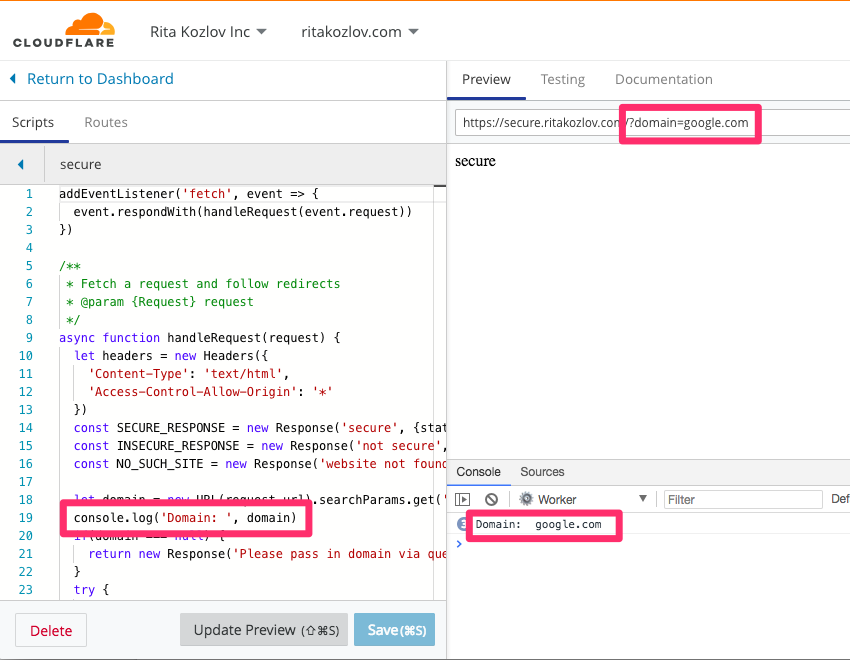
In preparation for Chrome’s Not Secure flag, which will update the indicator to show Not Secure when a site is not accessed over https, we wanted people to be able to test whether their site would pass. If you read our previous blog post about the existing misconceptions around using https, and preparing your site, you may have noticed a small fiddle, allowing you to test which sites will be deemed “Secure”. In preparation for the blog post itself, one of our PMs approached me asking for help making this fiddle come to life. It was a simple ask: we need an endpoint which runs logic to see if a given domain will automatically redirect to https.
The logic and requirements turned out to be very simple:
Make a serverless API endpoint
Input: domain (e.g. example.com)
Output: “secure” / “not secure”
Logic:
if http://example.com redirects to https://example.com
Return “secure”
Else
Return “not secure”
One additional requirement here was that we needed to follow redirects all the way; sites often redirect to http://www.example.com first, and only then redirect to https. That is an additional line of code I was prepared to handle.
I’ve done some Continue reading

Our Workers platform can be used for a ton of useful purposes: for A/B (multivariate) testing, storage bucket authentication, coalescing responses from multiple APIs, and more. But Workers can also be put to use beyond "HTTP middleware": a Worker can effectively be a web application in its own right. Given the rise of 'chatbots', we can also build a Slack app using Cloudflare Workers, with no servers required (well, at least not yours!).

We're going to build a Slack bot (as an external webhook) for fetching the latest stock prices.
This Worker could also be adapted to fetch open issues from GitHub's API; to discover what movie to watch after work; anything with a REST API you can make query against.
Nevertheless, our "stock prices bot":
/stocks MSFT as a shorthand.Using the cache allows you to improve your bot's response times across all invocations of your Worker. It's also polite Continue reading


Our newest data center is now live in Tel Aviv, Israel! This expands our global network even further to span 135 cities across 68 countries.
Although Israel will only be turning 70 this year, it has a history so rich we’ll leave it to the textbooks. Despite its small size, and young age, Israel is home to one of the largest tech scenes, often referred to as Start-up Nation.
Haifa’s Matam technology park houses a few tech giants’ offices including Intel, Apple, Elbit, Google, IBM, Microsoft, Yahoo, Philips and more. Meanwhile, Tel Aviv serves a true hipster capital, with a high concentration of great coffee shops to serve its many startup employees and founders.
Some brag-worthy Israeli inventions include flash drives, Waze and cherry tomatoes. This is due to Israel’s excellent education. Israel is home of the top universities in the world, bringing Israel to be one of the top five nations in scientific publication per capita output. Israel also has one of the highest PhD and MD degrees per capita, and among of the highest nobel laureates per capita as well. Israeli mothers, your nagging has paid off.
CC BY-SA 4.0 image by Rita Kozlov Continue reading